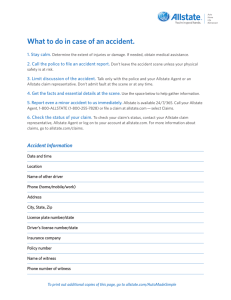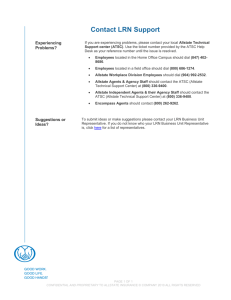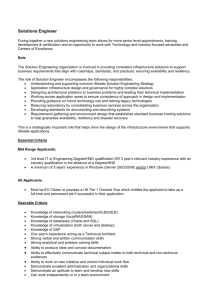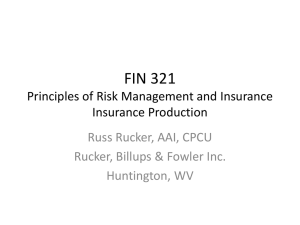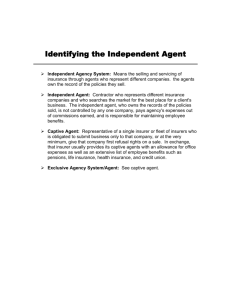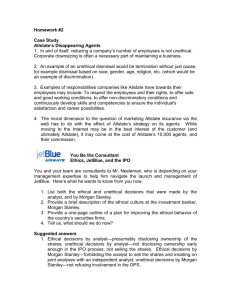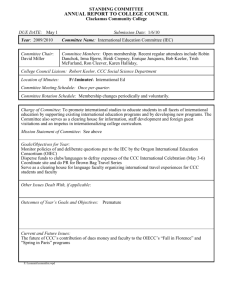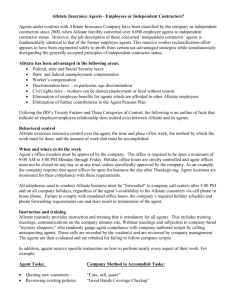10 Things Your Insurer Won't Tell You
advertisement
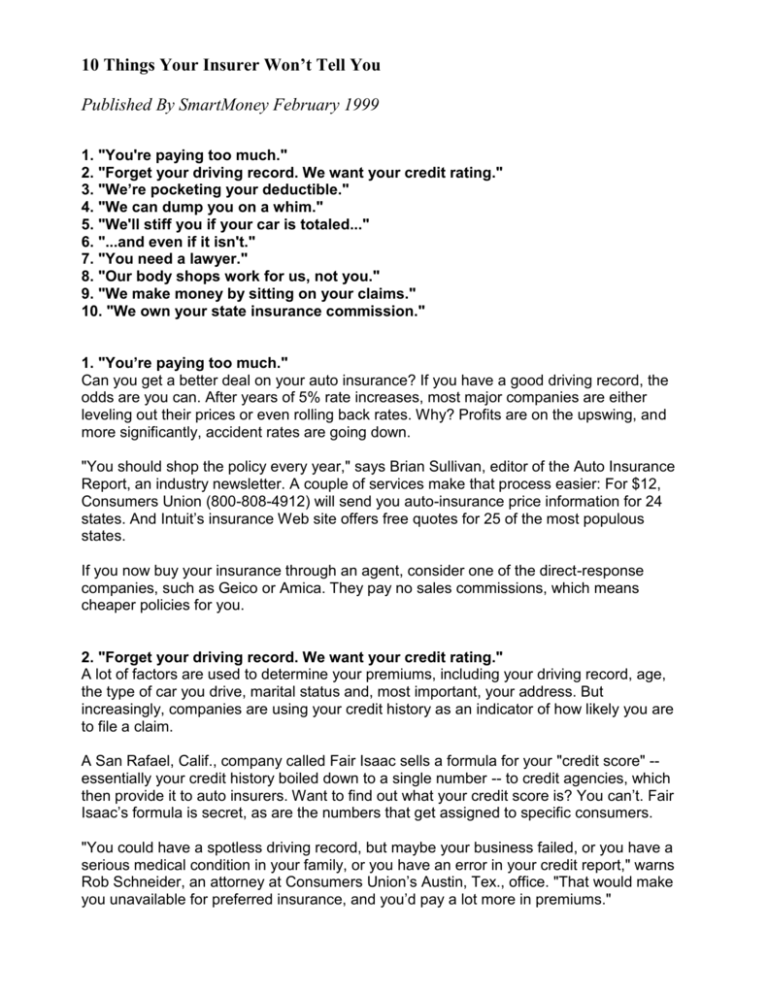
10 Things Your Insurer Won’t Tell You Published By SmartMoney February 1999 1. "You're paying too much." 2. "Forget your driving record. We want your credit rating." 3. "We’re pocketing your deductible." 4. "We can dump you on a whim." 5. "We'll stiff you if your car is totaled..." 6. "...and even if it isn't." 7. "You need a lawyer." 8. "Our body shops work for us, not you." 9. "We make money by sitting on your claims." 10. "We own your state insurance commission." 1. "You’re paying too much." Can you get a better deal on your auto insurance? If you have a good driving record, the odds are you can. After years of 5% rate increases, most major companies are either leveling out their prices or even rolling back rates. Why? Profits are on the upswing, and more significantly, accident rates are going down. "You should shop the policy every year," says Brian Sullivan, editor of the Auto Insurance Report, an industry newsletter. A couple of services make that process easier: For $12, Consumers Union (800-808-4912) will send you auto-insurance price information for 24 states. And Intuit’s insurance Web site offers free quotes for 25 of the most populous states. If you now buy your insurance through an agent, consider one of the direct-response companies, such as Geico or Amica. They pay no sales commissions, which means cheaper policies for you. 2. "Forget your driving record. We want your credit rating." A lot of factors are used to determine your premiums, including your driving record, age, the type of car you drive, marital status and, most important, your address. But increasingly, companies are using your credit history as an indicator of how likely you are to file a claim. A San Rafael, Calif., company called Fair Isaac sells a formula for your "credit score" -essentially your credit history boiled down to a single number -- to credit agencies, which then provide it to auto insurers. Want to find out what your credit score is? You can’t. Fair Isaac’s formula is secret, as are the numbers that get assigned to specific consumers. "You could have a spotless driving record, but maybe your business failed, or you have a serious medical condition in your family, or you have an error in your credit report," warns Rob Schneider, an attorney at Consumers Union’s Austin, Tex., office. "That would make you unavailable for preferred insurance, and you’d pay a lot more in premiums." Twelve states now have laws that limit the use of credit scores in auto insurance. In Hawaii, for example, the score can be used in the accept-or-deny decision but can’t affect how much you pay in premiums. In Louisiana, auto insurers aren’t allowed to include bankruptcies as a factor. But in the remaining 38 states, the use of credit scores is growing. 3. "We’re pocketing your deductible." If you're hit and it’s the other driver’s fault, his insurer is supposed to pay for damages to your car. But if his insurer stalls, you can file a claim on your own collision policy and let the two companies fight it out later. If your insurer ultimately wins the claim, you should get your deductible back, right? "If there’s clear fault, yes," says Brian Sullivan. Unfortunately, it doesn’t always work that way. Most states give insurance companies up to six months to go after the money owed by another company. After that, they’re required to either give you the deductible or let you go after the other company on your own. If they win only a partial settlement, a whole new set of rules kicks in. Usually, the winnings are split between you and your insurer. In 1996 State Farm paid out a $22 million settlement in Texas for failing to refund deductibles. That case set off a chain of 22 additional settlements by major insurers for the same offense, including Geico, Allstate, Prudential, Liberty Mutual and Nationwide. In the end, nearly $40 million was refunded to consumers in the state. 4. "We can dump you on a whim." The first 30 to 60 days after signing up for insurance is called the "binding period," and during that time the insurance companies can cancel your policy for just about any reason, often without explaining why. Maybe they’ll discover something they don’t like in your driving record or credit history. Or, if you file a claim, they might suddenly consider you a bad risk. After the binding period, state laws vary on when you can be dropped. In Arizona, using your personal car for business is cause for an insurer to cancel your policy. Miss a premium payment by just 10 days in Ohio and you can be canned. Even more common is "nonrenewal," when you’re simply cut off after your policy expires. In Texas, two accidents in 12 months is enough for an insurance company to refuse renewal, even if neither accident was your fault. What happens if you get nonrenewed? You’ll find yourself banished to the dreaded high-risk category of auto insurance, along with drunk drivers and Corvette-driving teenagers. Your premiums will go up at least 20%, and you probably won’t be able to get back to the standard category of insurance for three years, according to Ron Alford, an author who worked for more than 25 years as an insurance risk assessor. If you want to find out why your policy wasn’t renewed, good luck. The formulas that make decisions like these are proprietary, meaning that the insurance companies aren’t required to divulge specific details. 5. "We’ll stiff you if your car is totaled..." Your collision policy entitles you to fair market value for your totaled car’s worth. But the amount you actually get could leave you feeling shortchanged. Until the mid-1990s, insurers determined car values by averaging the prices in the National Market Reports Automobile Red Book and the National Automobile Dealers Association’s Official Used Car Guide. Now companies like CCC Information Services in Chicago control the market -- and the prices they give out are almost always lower than the book values. CCC looks at cars for sale in your area in similar condition, along with local ads, to determine values. But where the old book listings used to provide a "list" price (what the car might be offered for on a used-car lot), the CCC number represents a "take" price (the absolute lowest price that a used-car dealer would accept for it). Of course, there’s no guarantee that your insurer will pay you even CCC’s figure. "Our customer is the insurance company," says CCC senior vice president Jack Rozint. "We don’t provide the settlement amount." What can you do to protect yourself? When your insurer hands you a CCC report, it usually lists the actual cars the company used for comparison. Jot down the vehicle identification numbers to make sure they actually exist and that there are no mistakes. Jim Bryant of Neptune City, N.J., totaled his 1994 Mercedes 500 SEL, and his insurance company quoted him a CCC value of $9,500. On the report, an eight-cylinder diesel Mercedes was listed for comparison. Yet Mercedes has never made such a car. "They came back and gave us $12,770," Bryant says. "CCC has valued about 22 million vehicles," replies Rozint. "So you’re probably going to get a couple of people who say that theirs wasn’t done right." 6. "...and even if it isn’t." Ever hear of "diminished value"? The insurance companies are betting you haven’t. Even if your car is repaired after an accident, there could be flaws in the repair process. Either way, your car’s bound to be worth less in the resale market, and your insurance company is obligated to pay you the difference. "By just raising the issue of diminished value before the car is repaired, consumers can get a much better deal," says James Lynas, president of Wreck Checks, a service that will examine your car after it’s been repaired and tell you whether it’s lost some of its value. If it has, you can file a supplemental claim to recover the difference. (The service is available in 34 states; call 770-956-8700. Fees range from $75 to $150.) Lynas says that while insurance companies may try to fight you on it, diminished-value claims have been paid out in every state and by every major insurance company. When Jay Archer’s Lexus had $9,300 worth of repair work done after a hit-and-run accident, a Wreck Check assessor told him it had lost $3,964 of its value. His insurer, Geico, denied the supplemental claim on 10 separate occasions, Archer says, but through pleas, demands and arguments -- "I brought all my letters down to the Geico office in Dallas and had them stamp the date and who received it" -- Geico ultimately backed down. In the end, it wrote him a check for the full amount. 7. "You need a lawyer." Insurance companies don’t like to deal with lawyers, but few go to the lengths that Allstate does. Since 1993 the company has been sending brochures to its customers who’ve been in accidents, advising them that they don’t need a lawyer. Allstate even tells this to people insured by other companies after they’ve been in an accident with an Allstate customer. Fourteen states have complained about the brochures. The company claims it’s a freedom of speech issue and still sends the brochures out in every state but Connecticut and Massachusetts. Stacey Adkins of Parkersburg, W.Va., had more than $7,000 in medical bills following an accident in which the other driver was at fault. She didn’t get a lawyer because Allstate (which insured both drivers) advised her not to. Its offer? Just $1,000. Allstate also demanded access to her medical records and entered some of that information into a national database, where other insurers now have access to it. Adkins hired an attorney who won her a settlement of $12,000 for her injuries and is now suing Allstate for invasion of privacy, for lowballing on its initial offer and for unlawful practice of law. Allstate will not comment on specific cases. 8. "Our body shops work for us, not you." Most insurers have a list of body shops that they prefer to use through what’s called a "direct-repair program." It’s similar to managed care, in that you can take your car elsewhere but your insurance company might not pay the full cost of repairs if you do. The catch is that these direct-repair body shops get on the list by keeping their costs low -sometimes spending less time on repairs, using cheaper parts and overlooking damages that only an expert could spot. State Farm’s Service First program even includes a gag clause that prevents shop owners from talking to customers about their cars until they’ve cleared it with State Farm first. And because the companies hold so much clout, many shops can’t stay in business unless they stay on those preferred lists. After a car ran into her 1995 Camaro, Kim Goodman of Greenup, Ky., wanted to take it to a garage she knew. But her insurer, Grange, wouldn’t pay the estimate and told her to take it to Glockner’s, a nearby GM dealership on Grange’s list of direct-repair shops. When Goodman picked up the car three months later, the hood color didn’t match and the trunk leaked. Worse, she found out that Glockner’s had put used parts on the car. One year later, she’s taken it back to the dealership for follow-up work eight times and once to another shop. She’s had more than $20,000 worth of work done -- all paid for by Grange. "That car had been babied," Goodman says. "It’s a $20,000 piece of junk right now." Both Glockner’s and Grange declined to comment. 9. "We make money by sitting on your claims." When Laverne Hayden, a retiree from Lafayette, Ind., was rear-ended in 1994 while driving her 1989 Oldsmobile Regency, the other driver’s $50,000 liability policy wasn’t enough to cover her neck and spinal injuries. No problem, Hayden thought, because her Allstate policy included underinsured motorist coverage for situations just like that. Except that Allstate refused to pay her claim. Hayden then hired a lawyer who filed for arbitration against Allstate and won $110,000. Because her policy was capped at $100,000, the lawyer offered to take only that much, but Allstate refused to pay any of it, demanding a trial. Her lawyer had to file suit in federal court before Allstate finally backed down and paid Hayden the full amount of her claim. Total time from accident to settlement? Nearly four years. Cases like hers are what led the Indiana insurance commission to slap a $100,000 fine on Allstate for delayed claims payments last October. (Allstate is appealing the fine.) The average claim takes nine months to settle, according to Bob Hunter, the director of insurance for the Consumer Federation of America in Washington, D.C. It’s not entirely the industry’s fault, since most experts say you shouldn’t accept a final settlement until your doctor has cleared you of all possible injuries. That process can take months. But insurance companies are in no rush to write checks. The typical auto-insurance business model, Hunter says, is to break even on premiums -- that is, to pay out about the same amount that the firm takes in -- but profit from investing the money while the company holds it. 10. "We own your state insurance commission." The insurance industry is regulated at the state level, unlike banking and securities, even though many of the 1,500 insurance companies do business in more than one state. The result is a patchwork of often underbudgeted state agencies, each trying to control its own small corner of a multibillion-dollar industry. "Most small states are pretty bad," says Bob Hunter. "They don’t have the resources." In Florida, California and 10 other states, the insurance commissioners are elected officials, making them willing and often eager recipients of campaign donations from the companies they’re supposed to be regulating. In the remaining states, the position is a political plum, appointed by the government. No wonder so many former commissioners (and nine of the last 11 heads of the National Association of Insurance Commissioners, the central organizing body) left for private-sector insurance jobs, according to a story last year in The Wall Street Journal. "Insurance departments serve a dual function: financial regulation and consumer protection," says Nan Nases of the Illinois Department of Insurance. "It’s sometimes a fine line to walk." If you file a complaint, don’t expect much. In some cases, the state may be able to get an inattentive insurance company to at least return your phone calls. But only in extreme situations will the insurance commission think about legal action. And if any money is collected in fines, it goes to the state’s coffers, not yours. Smart Money Magazine

